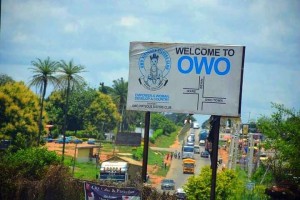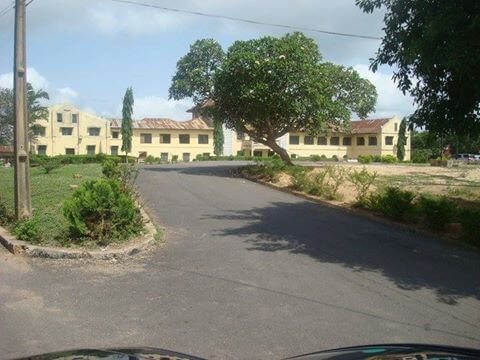
Owo; the headquarters of Owo Local Government Council in Ondo State did contribute significantly to the determination of some events in the political history of Nigeria. It was in the ancient town that Obafemi Awolowo first launched his political party, Action Group, between April 25 and 29, 1951. Owo produced the first executive governor of the old Ondo State, Michael Adekunle Ajasin.
The topography of the landmass is rugged, spotted by hills, and transverse by rivers and streams[i]. Situated at a strategic location towards the northern axis of Ondo State, the community is bounded by Akoko South Local Government in the north; River Ogbese which forms the boundary between Owo and Akure north in the west; Ose Local Government in the east and Edo State in the south. Poppulation of this town adjudged one of Ondo State’s five biggest is about half a million. There is a state-owned polytechnic, later named Rufus Giwa Polythecnic, a technical college, a private university and a renowned Federal Medical Centre in the town.
Owo township is 48 kilometers east of Akure and 400 kilometers north of Lagos. Sister towns in the Local Government Area of which Owo is capital include; Ipele, Uso, Iyere, Upemen, Idashen, Ilale, Isuada, Emure-Ile, and Amurin.
Origin
Like every other Yoruba community, Owo people also claim to be descendants of the great Oduduwa. The founders of the town were reported to have served at different times as traditional rulers or village heads in some communities around Ile-Ife. The two brothers who were the original founders of Owo are Olowo Ojugbelu Alaghaye and Ojomo Jagun. They decided to leave their domains near Ile-Ife after the people revolted against them. Ojomo Jagun was the first to leave. His friends and several people who loved them later decided to go with him to anywhere. Twelve elders known as Ighare and several youths known as Ilegbama were among those that made the trip out of Ile-Ife. In the course of the journey, it was agreed among them that wherever they decided to settle, Olowo will be their king. Incidentally, Olowo died on the way. This made the people resolve that anywhere they finally settled would be named after the great leader; thus the name Owo. In local dialect, the people call it Ogho.
Ojomo Jagun who was lucky to reach the new settlement with the people before he died too, but not until he was made the generalissimo; war commander and second-in-command to the Olowo. After his death, the position was not filled for a very long period because he was becoming too powerful to control. A new Olowo by name Olojogbon with a royal title of Alubiolokun was crowned. The monarch was said to be a very gooddrummer which made the people to organize an annual festival of drumming and dancing at the bank of river Ogbese, The festival is called Olokun and is still being celebrated till date. However, Oba Olojogbon was described as a despot, a situation that made the people to plot and kill him during the celebration of Olokun festival. Several other kings ascended the throne among who was one Ajaka who was reputed to be very powerful. He was said to have derived his power from mystic sources. He was killed during one of the several wars he led the people to fight.
Culture
The culture of beads was introduced to Owo through a trade relation it had with the old Bini Empire. The annual Igogo festival which is like Christmas for indigenes of Owo is being celebrated annually. This is the only festival that the Olowo, usually in the traditional regalia with beads, will dance and receive his brother Oba, the Ojomo who had left to form his own town known as Ijebu-Owo few meters away from Owo.
There are four quarters in Owo, each having its own head in the rank of High Chiefs. The quarter heads are also kingmakers of the town. The quarters are Ehinogbe headed by Osere; Igboroko is under Ojumu; Doro has High Chief Akoma while Isaipen is under the supervision of Ajana. The quarter chiefs form the highest level of authority next to the monarch. The Olowo as the monarch at Owo is respected among peers. Folagbade Olateru-Olagbegi III who died in 2019 at age 77 is in the line of Obas from three dynasties, the first commencing in 1019 AD[ii]. He was succeeded by a senior civil servant in Ondo State service Ajibade Gbadegesin Ogunoye during the tenure of , Ondo State Governor, Rotimi Akeredolu who was also Owo born.

Civilization/Development
Owo was exposed relatively early to civilization as report had it that the activities of early Christians were extended to the community. For instance, Saint Andrew’s Church was established in the town in 1920 with a well-travelled foreigner deployed as superintendent. The first school in the town, Ebenezer Native Baptist School was established in 1899 and Owo Government School came into being later in 1903. This assisted indigenes of the town, especially prominent cocoa farmers to send their wards to the missionary schools.
Occupation
The people are predominantly farmers and traders dealing in cocoa business. Early members of the cooperative societies in the town were the richest men of the town invest their money on construction of big houses while cocoa stores are strategically located within the community. As a result of early exposure of the indigenes to western education, they have prominent ones among them today virtually in all professions. The people are into peasant farming which make staple foods such as Garri, yam and cassava flour to be relatively cheap in the area[iii].
[i] Fact & Figures about Owo LGA, 1993
[ii] OmoElu Blog
[iii] Westerner 7 December, 2009





















